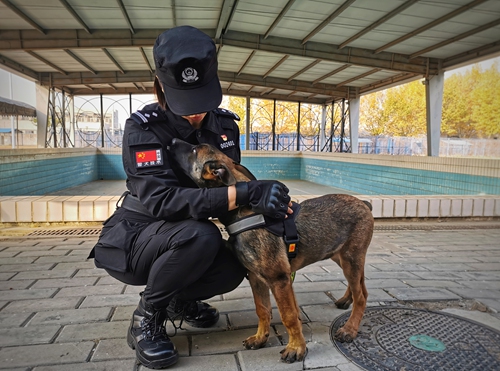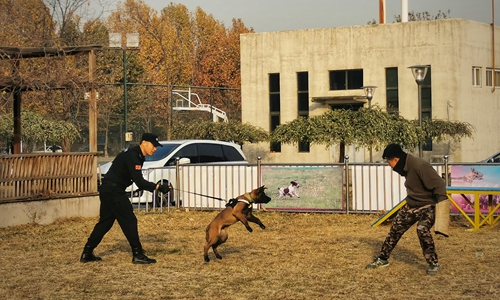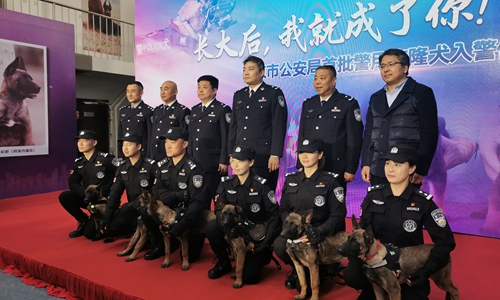HOME >> CHINA
Cloned K-9s begin training in Beijing
By Xu Keyue Source:Global Times Published: 2019/11/22 0:46:37

Liu Shasha, a K-9 trainer with a cloned dog in Beijing. Photo:Xu Keyue/GT
Beijing's first cloned K-9 unit, consisting of six 3-month old dogs, began training at a police facility on Wednesday, making the city's Public Security Bureau (PSB) home to the largest cloned K-9 unit in China.
Four members of the cloned K-9 unit were born during a single birth, marking another world's first, said PSB officer and veterinarian Ma Jinlei with the dog technical detachment division, to the Global Times.

A cloned K-9 during a training session in Beijing. Photo: Xu Keyue/GT

Six cloned K-9s begin training at a police facility in Beijing. Photo: Xu Keyue/GT
Five of the K-9 clone were from Sijiding, a five-year-old male sniffer Belgian Malinois, and member of the Beijing police. And one clone from A'rui, a four-year-old K-9 male, trained at biting and attacking, and the same breed as Sijiding, according to Ma.
Sijiding was recognized by the Ministry of Public Security as a meritorious dog, for contributions made from sniffing out explosive devices and materials.
The K-9 pups were born in early August at an experimental lab with the Beijing-based Sinogene Biotechnology Company and with the support of the Ministry of Public Security, Ma noted.
A study revealed the cloned K-9 DNA was over 99 percent similar to their donors.
Somatic cells preserve quality breeding and make volume reproduction possible, said police officer Wang Lei, to the Global Times on Wednesday. .
The birth of the six K-9s marked a breakthrough in animal clone technology and will significantly reduce the amount of time it takes to train dogs, Wang said.
According to a report from Science and Technology Daily, it would take four to five years to train dogs like Sijiding and A'rui, and cost 400,000 ($59,560) to 500,000 yuan.
After conducting a series of tests, Liu Shasha, a dog trainer at the Beijing Dog Base of Public Security, said the cloned dogs show better potential than normal-bred police dogs.
The abilities of the cloned K-9s are already similar to a six-month-old normal-bred police dog, Liu noted.
Ma said preserving K-9 blood has always been a challenge for breeders, as traditional methods diluted the original, making the subsequent generation's genes hard to manipulate.
The advanced K-9 clone technology would address those problems and lower fail-rates at the puppy stage, Ma explained.
Ma also noted they will continue to work with biotechnology companies on cloning K-9 litters, and establish a somatic cell bank to preserve and breed high-quality dogs.
Posted in: SOCIETY